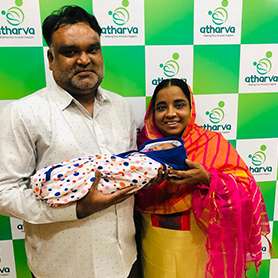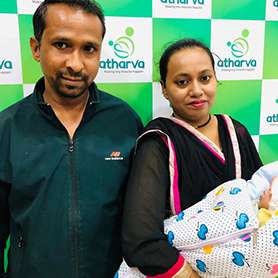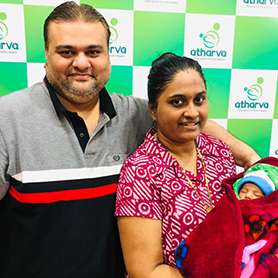Home > Treatment > Recurrent Pregnancy Implantation failure
Recurrent implantation failure describes the inability of a woman under the age of 40 to conceive clinically following the transfer of at least four
high-quality embryos in at least three fresh or frozen cycles. Factors related to the uterus or the embryo may be the cause of the failure to implant.
Recurrent implantation failure (RIF) may pose a significant burden on a couple physically, emotionally, and financially.
Recurrent pregnancy loss (RPL), also known as recurrent miscarriage or chronic abortion, is traditionally understood as three successive pregnancies
lost before 20 weeks from the last menstrual cycle. Around 1-2% of women are experiencing recurrent miscarriages. Before going for another pregnancy
requires proper diagnostic testing and therapeutic intervention are recommended to treat the underlying cause and avoid the risk of subsequent fetal loss.
Uterine abnormalities, immunological conditions such as antiphospholipid syndrome, endocrine conditions, advanced maternal age, abnormality
in the uterus, and genetic disorders can all contribute to recurrent miscarriages.
At first, specialists at the infertility center will carry out a detailed medical, surgical, genetic, and family history followed by a physical examination.
Karyotype analysis is done to determine the chromosomal or genetic abnormalities in both partners that result in recurrent miscarriages.
Evaluation of the uterus (womb) and uterus cavity is carried out using ultrasound, saline ultrasound, hysterosalpingogram X-ray, MRI, or
hysteroscopy. These techniques help in determining the shape of the uterus as well as the presence of any abnormalities like fibroids,
the location of fibroids, polyps, or scarring. Test for hormone function, antiphospholipid antibodies, abnormal blood clotting, and ovarian
reserve test is also carried out to determine the underlying cause of fetal loss.
Treatments available to alleviate the risk of fetal loss include:
Surgery can rectify concerns related to the uterus (womb), like correcting the uterus's size and removing Fibroids / septum/synechiae. The surgery procedure can be carried out in 1-day and takes around 1-week to recover.

Conditions like autoimmune disorder, blood clotting issues, abnormal blood sugar levels, over or under-active thyroid gland, or high hormone prolactin levels can be treated with the right medications to prevent miscarriages.

Preimplantation genetic screening (PGS), which evaluates for the existence of faulty genetic components by taking a biopsy from one cell of the embryo, is one approach that can help in choosing the most "capable" embryos for transfer. Time-lapse imaging makes it possible to monitor embryo development in real-time and choose the best embryos for implantation during In-vitro fertilization to prevent RIF.

Infertility specialists at Atharva Infertility Center specialize in managing the difficult cases of multiple failures by thorough use of scientific analysis, advanced diagnostic procedures, and specialized evidence-based care.





11 October 2022

12 October 2022

13 October 2022

Dr. Yeshwant Mane is an Infertility Specialist who
is currently practicing at Atharva Infertility Centre.
Dr. Pallavi Mane is practicing obstetrician and Gynaecologist with special interest in High Risk Pregnancies and Sonologist

Address
Atharva Infertility Centre,
Trimbak Naka Signal, Near Petrol Pump ,Old Mumbai-Agra Road, Nashik 422002, Maharashtra

Contact Info


Working time
Monday 09:00 AM - 09:00 PM
Tuesday 09:00 AM - 09:00 PM
Wednesday 09:00 AM - 09:00 PM
Thursday 09:00 AM - 09:00 PM
Friday 09:00 AM - 09:00 PM
Saturday 09:00 AM - 09:00 PM
Sunday Closed